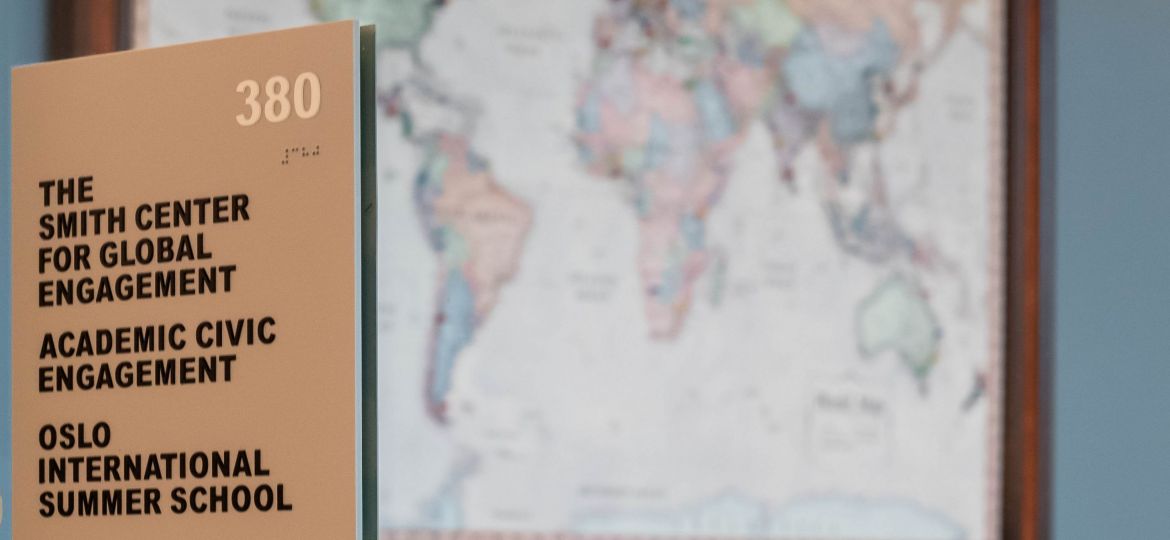
Off-campus study is one of St. Olaf’s most popular opportunities, but it is not without its challenges. In Nov. 2022, Saji Nammari ’23 criticized the College’s program in Jerusalem. Nammari, who is from Jerusalem, said in an email to numerous campus organizations, faculty, and staff that the programs are guilty of “excluding St. Olaf students, inadvertently placing St. Olaf students in danger, and reinforcing apartheid by normalizing and desensitizing the violent occupation of Palestine.” His email prompts a conversation about the inclusivity, safety, and ethics of such programs. This begs the question — what happens when there are political conflicts in study abroad locations?
The Smith Center for Global Engagement Director, Jodi Malmgren ’92, said that discussion about this issue is ongoing to ensure the faculty make the best possible decision about programs in Jerusalem. Safety is routinely monitored, especially as political situations can change very quickly. “We have pretty established protocols to be monitoring the safety of our students,” Malmgren said. “We have government sources, we have partners, we have other universities that we’re constantly reaching out to.” Risks are communicated to students and high enough risks result in programs being discontinued altogether.
On the issue of inclusivity, Malmgren noted other instances in which programs would not be inclusive. For instance, there are many places that are unsafe for LGBTQ+ students. “There are lots of reasons why we can’t have perfectly equitable access to every program,” said Malmgren. “Our goal is instead to have a range of programs in various places around the world and various types of programs to make sure that we have study abroad programs that are accessible.”
In his email, Nammari also raised the question of inclusivity, citing the fact that due to Israeli laws which restrict the movement of Palistenians, Palestinian students are effectively unable to attend study abroad programs in Israel or Palestine.
Malmgren said the curriculum committee also acknowledges the ethical question of sending students to a place where the rights of Palestinians are under threat. “We are trying to do things like choose the right partners,” Malmgren said. “Our partners are Palestinian and American partners. So we are trying to support the Palestinian people, even if we are in a region where they do not have full citizenship.”
Many programs have ethical concerns, which means these same conversations exist for those programs as well.
If significant concerns are brought up, a program can be withdrawn even if it is not up for review.
Russia’s invasion of Ukraine prompted the cancellation of select study abroad programs. However, this does not mean there are no study abroad options for Russian majors. Instead of traveling to Russia, there is more focus on post-Soviet republics like Armenia and Kazakhstan. “Students now are still learning the Russian language, which is the lingua franca for that area of the world,” said Professor Marc Robinson, Department Chair of Russian Language and Area Studies. “But they get to see it within the context of another culture that’s using it as a second language.”
Students are also learning new languages such as Armenian or Kazakh while they study in these countries. This means that even though students can no longer get first hand experience with living in Russia, there is still tremendous insight to be gained from living in surrounding countries which provide different yet informative experiences.
The continued conversations about the programs to Jerusalem mean there is not yet a consensus on whether or not to continue these programs. These challenges are complex and deserve thorough conversations. Russian study abroad programs adapting due to the invasion of Ukraine shows programs are able change how they are structured in response to ethical concerns, while continuing to provide students with growth and robust educational experiences. “We have to grapple with the issues and come to the best decision we can,” Malmgren said.









